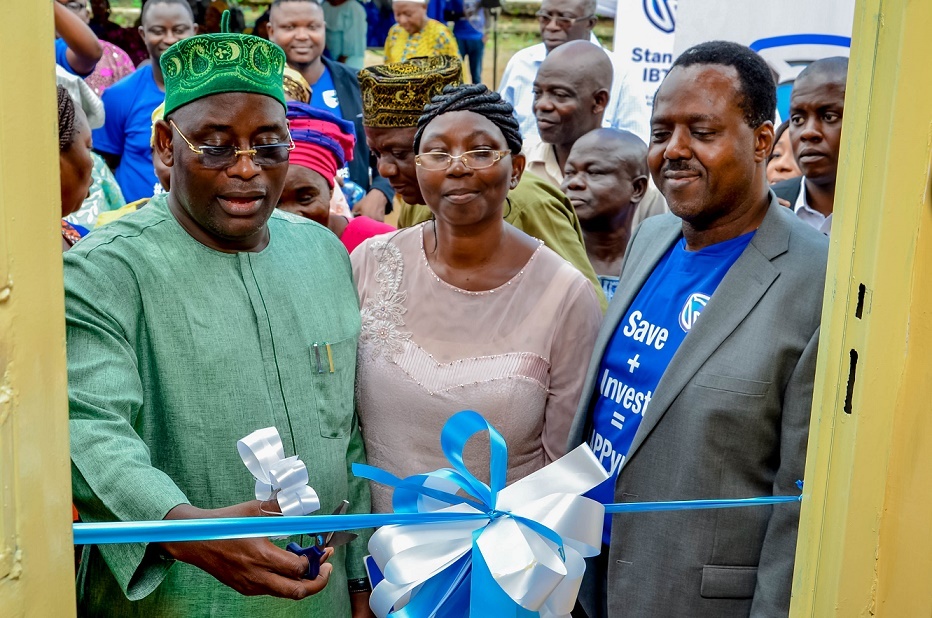Education
Education Sector and FG’s Promises

By Jerome-Mario Chijioke Utomi
There are two recent exciting events in the country that provided sidelight to this particular piece. Fortunately, also both are education sector-specific.
First, the recent in Abuja while receiving members of the Nigeria Inter-Religious Council (NIREC) led by the Co-Chairs, the Sultan of Sokoto, Alhaji Muhammad Sa’ad Abubakar, and the President of the Christian Association of Nigeria, Revd. (Dr) Samson Olasupo Ayokunle.
In that meeting, Mr President Muhammadu Buhari among other things stated that the Federal Government remains committed to honouring promises made to the Academic Staff Union of Universities (ASUU) to prevent disruptive strikes, engender uninterrupted academic programmes and improve funding of educational institutions.
The second has to do with another similar decision/pledge by the Federal Government of Nigeria, during the celebration of the International Day of Education, to increase Nigeria’s annual domestic expenditure on education by 50 per cent over the next two years, and by 100 per cent by 2025.
Interestingly, this piece is not the only one that viewed the comments, particularly the second development as a right step taken in the right direction.
Take, as an illustration, a statement issued and signed on Monday by Geoffrey Njoku, UNICEF Communication Specialist in Maiduguri, among other things, which said, “The Nigerian government has committed to increasing funding for education, which is a very important step. Far too many Nigerian children today are not in the classroom and for those who are; far too many are not getting a solid education that can translate into good prospects for their futures. This is a step forward, an increase from 5.7 per cent allocated for 2021, though there is still a long way to go to reach the internationally recommended benchmark that countries spend 15-20 per cent of their national budgets on education”.
The statement added that “at least 10.5 million children are out of school in Nigeria, the highest rate in the world. A full one-third of Nigerian children are not in school, and one in five out-of-school children in the world are Nigerian,” said Peter Hawkins, UNICEF Representative in Nigeria.
Essentially, aside from what UNESCO said, there are of course in my view other intrinsic reasons why the latest moves by the Federal Government, if implemented, deserve the commendations of Nigerians.
Chronic perennial underfunding visited on the sector by the past and present administrations have as a consequence impeded public universities lecturers from carrying out scholarly research, truncates academic calendar with strike actions, laced Nigerian universities with dilapidated and overstretched learning facilities with the universities producing graduates devoid of linkage with the manpower demand by the nation’s industrial sector.
Most pathetically, this age-long challenge has in some public institutions of higher learning led to a thoughtless demand for fees of varying amounts/proposed by the school authorities, a development that financially squeezed the life out of the innocent students and their parents while stripping our education process and outcome fairness.
Take as an illustration of underfunding, the Nigerian government’s initial budget for 2020, going by reports, was N10.5 trillion ($25.6 billion) of which N686.8 billion ($1.7 billion) was for education. But because of the COVID-19 pandemic, this was amended. The overall budget was increased slightly to N10.8 trillion, but that for education fell to N607.7 billion. The allocation to the education of N686.8 billion worked out to 6.5% of the initial 2020 budget. The revised budget of N10.8 trillion meant that education’s share of N607.7 billion then accounted for 5.6% of the total.
According to the country’s budget office, the funding allocated to the basic education commission in 2020, in the initial and amended budgets, are as follows; the initial budget, N137.97 billion ($336.5 million) was allocated to the commission. In the amended budget, the allocation dropped to N79.9 billion ($194.8 million).
Despite these efforts, the budgetary allocation to the education sector for the said year did not scratch the surface of the UNESCO budgetary recommendation to nations, which currently stands at between 20/26%.
The above failure and failing coupled with another mirage of challenges within the sector have rendered the present move by, and celebration of the Federal Government present effort/promise as a new invention which usually comes with opportunities and challenges.
This assertion is predicated on the fact that the challenges confronting the education sector in Nigeria are hydra-headed and go beyond perennial underfunding to include dilapidated learning facilities, overcrowded classes and obsolete policies among others. A case that calls for more work, reforms holistic approach in ways that demand from the Federal Government the urgent need to go beyond this present promise.
Take as another illustration, the Institute for Statistics (UIS), the official statistics agency for the United Nations Educational, Scientific and Cultural Organization (UNESCO) have till, when discontinued publishing these indicators in September 2020, because it had since adopted other indicators, recommended about 58 pupils to every qualified teacher. But that is not the situation in most schools in Nigeria, particularly the state/federal government-owned primary and secondary schools.
More specifically, a visit to the public schools (both primary and secondary) in some Northern and Southern parts of the country not only supports this belief but says something ‘new and different. Even in other Southern states, the situation is not different. In Lagos for example, where there is a huge demand for learning opportunities, the number of students per teacher/per class is far above the UNESCO recommendation. The facts are there and speak for it.
It is also of truth, says a research report, that there are still a huge number of those who are in these schools, but are learning nothing-as schooling does not always lead to learning. In Nigeria, it is finally becoming evident that there are more non-learners in school than out of school.
Presently also, the world is in agreement that it has not been an easy road for the Nigerian education sector. Since May 1999, when democracy re-emerged on the political surface called Nigeria, it has been a tough and tumbles ride. Even the practice of democracy in the country, contrary to earlier beliefs, has not helped to stop the pangs of challenges experienced by Nigerians in the sector.
Both the federal and state governments in Nigeria continue to allow the rate of out of school children, especially in the northern part of Nigeria, to swell in number, even when it is obvious that the streets are known for breeding all forms of criminals and other social misfits who constitute the real threat in the forms of armed robbers; thugs, drunkards, prostitutes and all other social ills that give a bad name to the society, Nigerians are beginning to view Government’s approach to the challenge as not yielding the targeted result.
Just very recently, it was reported that out of the seventeen states in the country with the highest number of out-of-school children, 14 of the states are in the North. The commentary also noted that if the rate of out of school children can be curtailed, it would help check the insecurity that is currently bedevilling parts of the country, and would to a large extent signal goodbye to insecurity threats across the country.
For the recent promises by Federal Government to bear the target fruit, one point we must all bear in mind is that the major problem standing in the way/preventing Nigerians from enjoying piece in the education sector is the government’s progressive non-recognition of the right to education as a human right despite their membership of a number of international conventions, including the International Covenant on Economic, Social and Cultural Rights where the right is respected.
Utomi Jerome-Mario is the Programme Coordinator (Media and Public Policy), Social and Economic Justice Advocacy (SEJA), a Lagos-based Non-Governmental Organization (NGO). He can be reached via Je*********@***oo.com/08032725374
Education
Hallos Launches Learning247 Summit

By Adedapo Adesanya
Live-learning and creator-economy platform, Hallos, as part of its expansion drive, has unveiled plans to equip millions of youths and women with digital skills and monetisation opportunities through the Learning247 Hallos Summit, aimed at integrating Nigeria’s South-East into the rapidly expanding global creator economy.
At a sensitisation and stakeholder engagement forum in Enugu, the organisation also called for stronger strategic partnerships with government agencies, educational institutions, development organisations, media houses and private-sector stakeholders to advance the creator economy as a credible engine for mass employment, youth prosperity and inclusive economic growth.
The chief executive of Hallos, Mr Alexander Oseji Uzoma, renewed the call for increased investment in internet penetration, reliable power supply, digital infrastructure, creative studios and youth-focused innovation hubs across Nigeria, especially the South-East.
Describing the creator economy as one of the most accessible and scalable employment frontiers globally, he noted that with basic tools such as a smartphone, internet access and creative skills, young people can build audiences, monetise knowledge and generate sustainable income without heavy capital investment or long career pathways.
According to Mr Uzoma, the creator economy offers low-barrier entry into diverse professions, including content creation, social media influencing, live tutoring and digital coaching, video production, podcasting, graphic design, music and performance arts, digital marketing, merchandise design, e-commerce and community management. These activities support a broader value chain spanning production, distribution, technology and management.
The Hallos co-founder also explained that global projections place the creator economy in the hundreds of billions of dollars, with millions of creators worldwide earning sustainable incomes, stressing that Hallos is focused on localising these opportunities to ensure African youths can participate meaningfully and compete globally.
He further noted that Hallos operates a live-learning and creator-focused platform that integrates education, gamified quizzes, merchandising and voluntary fan donations into a single ecosystem. Through the platform, creators can host live learning sessions and masterclasses, earn from quizzes and challenges, sell branded merchandise, receive voluntary donations, build communities around their expertise and organise monetisable podcasts.
Mr Uzoma said the creator economy, driven by social media platforms, streaming services, digital commerce and content monetisation tools, has evolved into a major global industry capable of generating wealth, creating jobs and expanding export earnings.
He stressed that social media should no longer be viewed as a recreational space but as a viable business environment for wealth creation.
“The focus should not just be on content creation alone but on building businesses around content. It is about value creation and structured digital entrepreneurship,” he said.
He disclosed that Hallos intends to reach about 10 million youths nationwide, with over 5,000 already engaged across its programmes, while placing strong emphasis on bridging the gender gap by empowering women and girls through targeted digital training, mentorship and access to monetisation platforms.
As the digital economy continues to expand, Hallos said the creator economy stands out as a practical and scalable solution to youth unemployment, offering low entry barriers and global earning potential.
The company reaffirmed its commitment to bridging the gap between talent and income, enabling young Africans to earn well above minimum wage through creativity, knowledge and structured participation in the global digital economy.
Education
Bayero University PG Students to Enjoy Dangote’s N1.5bn Scholarship

By Modupe Gbadeyanka
Post-graduate students of Bayero University Kano (BUK) will benefit from a scholarship worth about N1.5 billion from the Aliko Dangote Foundation (ADF).
The businessman put down the funds to support eligible MBA, entrepreneurship, and management postgraduate students of the institution under an initiative known as MHF Dangote Graduate Business Scholarship.
At a ceremony on Tuesday, the foundation and the school signed a Memorandum of Understanding (MoU) at the auditorium of the Dangote Business School, Kano.
The deal is to provide N300 million annually over five years as scholarship awards to the beneficiaries, who will receive N150,000 each per session, beginning with the 2024/25 academic session. This is equivalent to 50 per cent of the current N300,000 fee paid by the post-graduate students. There are 1,225 students in the Business School (696 fresh and 529 returning students).
One of the beneficiaries, Mr Khalid Bababubu, who is into manufacturing and specialises in MBA, Finance and Investment, thanked the organisation for the gesture.
“We are happy to be beneficiaries of this initiative. Education is the bedrock of national development, and we will not take this scholarship for granted,” he said.
A representative of ADF, Ms Mariya Aliko Dangote, said, “Our vision at the Foundation is to build human capital that translates into economic opportunity.
“Strengthening business and entrepreneurship education is critical to turning knowledge into enterprise, innovation, and jobs. This scholarship deepens our commitment to Dangote Business School by investing directly in the next generation of business leaders and change-makers.”
On his part, the Vice Chancellor of Bayero University Kano, Prof. Haruna Musa, said, “This support comes at a critical time for many families. Beyond financial relief, it strengthens the Business School’s role as a centre for developing entrepreneurial and management talent, particularly for women who are increasingly taking leadership roles in enterprise.”
It was explained that newly admitted students will receive automatic tuition reductions during registration, and returning students who have already paid in full will receive rebates. The N300 million allocation is structured to cover all eligible postgraduate students based on current enrolment capacity.
Any unutilised balance in the first year will be retained within the Dangote Business School development envelope to strengthen learning infrastructure and digital academic capacity, ensuring continued enhancement of the academic environment.
The MHF Dangote Graduate Business Scholarship is distinct from ADF’s recently announced nationwide STEM education interventions.
Education
Entries for InterswitchSPAK 8.0 Begin, Over N40m up for Grabs

By Aduragbemi Omiyale
Senior secondary school students across Nigeria have been invited to apply and demonstrate their academic excellence on a national stage in the eighth edition of the prestigious national science competition known as InterswitchSPAK.
The contest is organised by Interswitch, Africa’s leading technology company focused on creating solutions that enable individuals and communities prosper.
Registration for InterswitchSPAK 8.0 via www.interswitchspak.com has opened and will close on Friday, May 24, 2026. For the first time, in addition to group registrations through schools, parents can also register their individual children for the competition.
This year’s edition features a scholarship pool exceeding N40 million, with Interswitch expanding the prize structure to ensure broader impact.
The overall winner will receive a N15 million tertiary scholarship, including monthly stipends. The first runner-up will be awarded a N10 million scholarship, including monthly stipends; while the second runner-up will receive a N5 million scholarship, also including monthly stipends. All scholarships are payable over 5 years. Also, the top 9 finalists will all receive brand new laptops and other exciting prizes.
In addition to the top prizes, Season 8 introduces enhanced rewards for student finalists ranked 4th to 9th, as well as increased recognition for teachers supporting qualifying students from 1st to 9th place. This expanded structure reinforces Interswitch’s commitment to rewarding academic excellence and recognising the critical role educators play in shaping student success.
“At Interswitch, we strongly believe that Nigeria’s future will be shaped by how well we nurture today’s young minds. InterswitchSPAK goes beyond competition; it is a long-term commitment to empowering students and supporting teachers who are laying the foundation for innovation, problem-solving, and national development.
“As we launch Season 8, we remain focused on creating opportunity, rewarding merit, and inspiring excellence across Nigeria,” the Executive Vice President for Group Marketing and Communications at Interswitch, Ms Cherry Eromosele, said.
Designed to empower young minds in the Science, Technology, Engineering, and Mathematics (STEM) areas, InterswitchSPAK identifies, nurtures, and rewards students while equipping them with the skills and knowledge required to excel in STEM fields and drive innovation.
Over the past seven seasons, InterswitchSPAK has positively impacted thousands of students across the country, offering full university scholarships, mentorship opportunities, and national recognition for outstanding academic performance.
Beyond these rewards, the programme has consistently reinforced the importance of STEM education as a critical driver of innovation, problem-solving, and sustainable national development.
Through a transparent, technology-enabled selection process, InterswitchSPAK has also promoted educational equity by providing students from diverse socio-economic backgrounds with equal access to opportunity, ensuring that performance and merit remain central to success.
-

 Feature/OPED6 years ago
Feature/OPED6 years agoDavos was Different this year
-
Travel/Tourism10 years ago
Lagos Seals Western Lodge Hotel In Ikorodu
-

 Showbiz3 years ago
Showbiz3 years agoEstranged Lover Releases Videos of Empress Njamah Bathing
-

 Banking8 years ago
Banking8 years agoSort Codes of GTBank Branches in Nigeria
-

 Economy3 years ago
Economy3 years agoSubsidy Removal: CNG at N130 Per Litre Cheaper Than Petrol—IPMAN
-

 Banking3 years ago
Banking3 years agoSort Codes of UBA Branches in Nigeria
-

 Banking3 years ago
Banking3 years agoFirst Bank Announces Planned Downtime
-

 Sports3 years ago
Sports3 years agoHighest Paid Nigerian Footballer – How Much Do Nigerian Footballers Earn



















